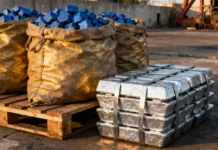The price of iron ore fell to within shouting distance of all-time lows on Thursday with even high-quality lump producers caught up in the bearishness.
On Thursday the benchmark 62% Fe import price including freight and insurance at the Chinese port of Tianjin gave up more than 1% to $47.70 a tonne, the lowest since the July 8 record low of $44.10 and down 8.2% over the past two months.
Fines drive the iron ore price and it makes up the bulk of supply, but producers of so-called “lump” ore enjoy a little more breathing room.
Lump ore can be loaded directly into blast furnaces and is also easier to handle during transportation and can continue to be shipped during wet seasons (liquefaction can be an issue with the shipment of iron ore fines during wet weather). For steelmakers it cuts pollution and lowers cost and lump now constitutes between 15%–20% of blast furnace feedstock.
Lump premiums are down to $3 a tonne, from nearly $20 at the start of the year
China’s steelmakers have been gradually substituting domestic supply with lump from Australian, South African and South American producers pushing cargoes to 250 million – 300 million tonnes per annum, but this week even lump exporters were swamped by the pervading bearishness.
This week spot lump premiums dropped to the lowest so far this year at $0.05 per dry metric tonne for November contracts. That translates into a premium of just over $3 a tonne.
That’s down a whopping 80% from the $0.31 per dmtu achieved at the start of the year and compares to a slump in the underlying fines price of 30%, although seasonal factors come into play during winter months when cold temperatures in China’s north reduce local concentrate supply.
The world’s first lump derivatives were launched on the Singapore Exchange at the end of August. SGX announced this week that trading swap contracts surged 22% in October compared to the previous month, with 1.1 million tonnes cleared.





















